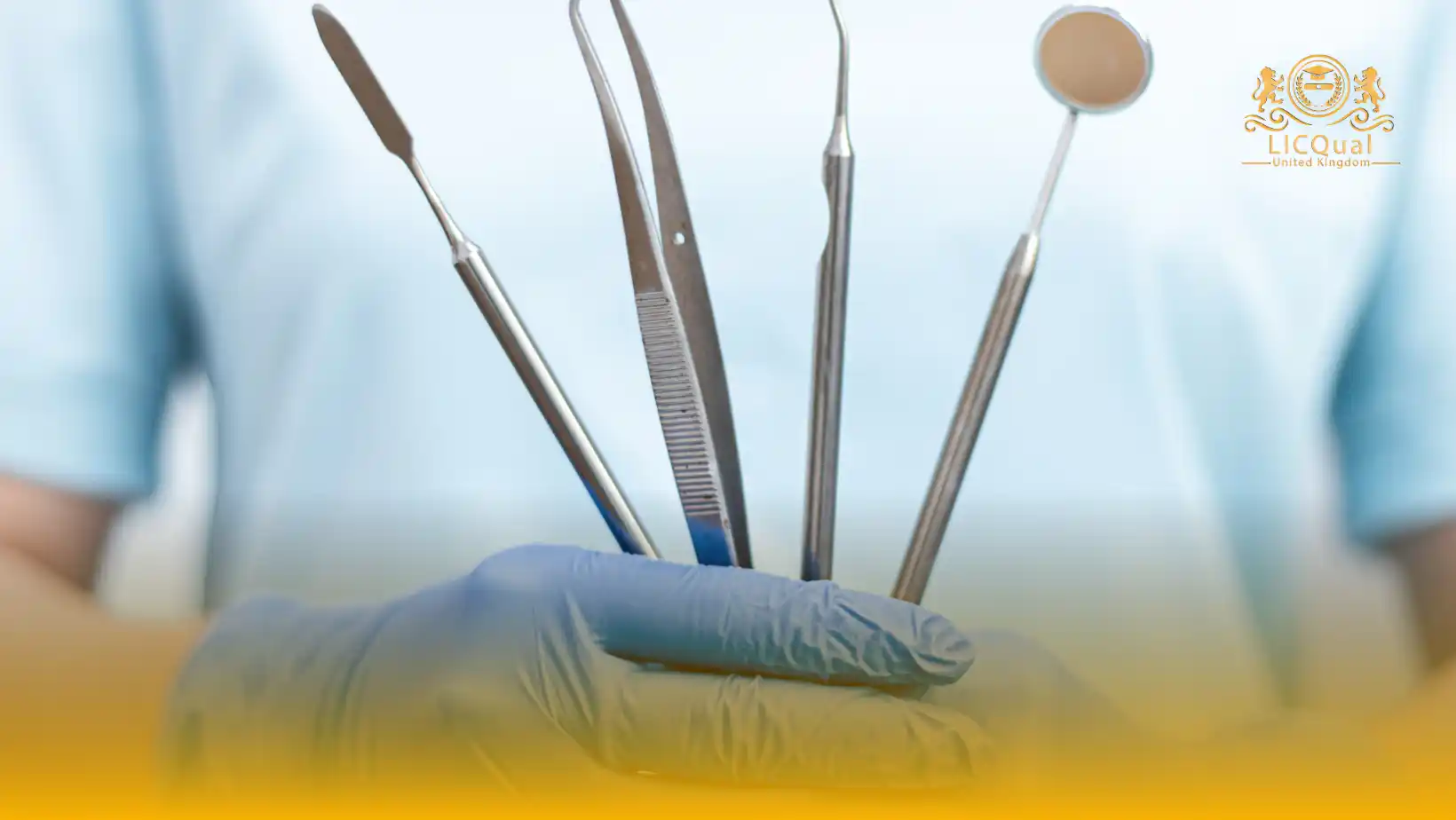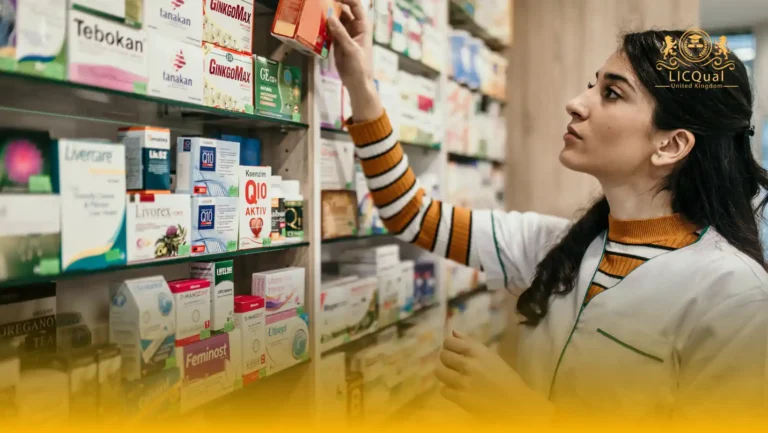The LICQual Level 3 Diploma in Dental Materials is a specialized qualification designed for dental professionals who wish to advance their knowledge and expertise in the selection, application, and performance of materials used in modern dentistry. Dental materials play a vital role in restorative procedures, prosthodontics, orthodontics, and preventive care, making this diploma essential for practitioners seeking to enhance their professional competence and improve treatment outcomes.
This qualification is not intended for fresh candidates. It is specifically developed for professionals who already have experience in dentistry and wish to expand their career prospects, strengthen their clinical decision-making, and enhance their Continuing Professional Development (CPD). Learners undertaking this diploma will explore the properties, advantages, and limitations of various dental materials, gaining the skills to select and apply them effectively in a range of clinical scenarios.
Centres delivering this qualification must ensure high-quality training by employing competent and qualified staff with relevant expertise in dental sciences and clinical practice. In addition, centres must provide access to appropriate resources, including up-to-date learning materials, laboratory equipment, and simulation facilities, to create a supportive and practical learning environment that enables learner success.
By completing the LICQual Level 3 Diploma in Dental Materials, learners will develop specialist knowledge in this crucial area of dentistry, enhance their professional profile, and be well-prepared to meet the growing demands of modern dental practice. This diploma also supports lifelong learning and contributes to continuous career progression in the dental field.
Course Overview
Qualification Title
LICQual Level 3 Diploma in Dental Materials
Total Units
6
Total Credits
60
GLH
240
Qualification #
LICQ2200666
Qualification Specification
To enroll in the LICQual Level 3 Diploma in Dental Materials, applicants must meet the following criteria:
|
Qualification# |
Unit Title |
Credits |
GLH |
|---|---|---|---|
|
LICQ2200666-1 |
Fundamentals of Dental Materials Science |
10 |
40 |
|
LICQ2200666-2 |
Restorative and Aesthetic Materials |
10 |
40 |
|
LICQ2200666-3 |
Prosthodontic and Orthodontic Materials |
10 |
40 |
|
LICQ2200666-4 |
Biocompatibility and Safety of Dental Materials |
10 |
40 |
|
LICQ2200666-5 |
Advances in Dental Materials and Digital Dentistry |
10 |
40 |
|
LICQ2200666-6 |
Practical Applications, Case Studies, and CPD Development |
10 |
40 |
By the end of this course, learners will be able to:
Unit 1: Fundamentals of Dental Materials Science
- Understand the physical, chemical, and mechanical properties of dental materials.
- Differentiate between various categories of dental materials and their uses.
- Analyse how environmental and oral conditions affect the performance of dental materials.
- Apply the principles of material science in clinical and laboratory contexts.
Unit 2: Restorative and Aesthetic Materials
- Identify the properties, advantages, and limitations of restorative materials such as amalgam, composites, and glass ionomers.
- Evaluate the selection of materials for different restorative and aesthetic treatments.
- Demonstrate understanding of handling techniques and application methods in restorative dentistry.
- Assess the role of restorative materials in improving oral function and aesthetics.
Unit 3: Prosthodontic and Orthodontic Materials
- Understand the properties and clinical applications of impression materials, denture base polymers, and orthodontic wires.
- Evaluate the suitability of different materials for prosthodontic and orthodontic treatments.
- Apply knowledge of material behaviour in designing and delivering effective prostheses and appliances.
- Analyse the impact of material choice on treatment success and patient satisfaction.
Unit 4: Biocompatibility and Safety of Dental Materials
- Recognise the biological responses of oral tissues to various dental materials.
- Evaluate issues of toxicity, allergenicity, and long-term safety.
- Apply knowledge of safety protocols to minimise risks to patients and practitioners.
- Demonstrate awareness of regulatory and ethical considerations in material use.
Unit 5: Advances in Dental Materials and Digital Dentistry
- Explore new technologies such as ceramics, CAD/CAM systems, and nanomaterials.
- Analyse how innovations are shaping modern restorative and prosthodontic dentistry.
- Evaluate the advantages and limitations of advanced dental materials.
- Apply emerging technologies to clinical practice in line with current trends.
Unit 6: Practical Applications, Case Studies, and CPD Development
- Apply theoretical knowledge of dental materials to practical clinical and laboratory scenarios.
- Critically analyse case studies to strengthen clinical decision-making skills.
- Reflect on personal professional practice to identify areas for growth.
- Demonstrate commitment to Continuing Professional Development (CPD) through structured learning strategies.
The LICQual Level 3 Diploma in Dental Materials is designed for dental professionals, clinicians, and laboratory technicians who want to deepen their understanding of dental materials science and practical applications. This course is ideal for those seeking advanced knowledge, hands-on skills, and internationally recognized credentials in restorative and prosthetic dentistry. Whether you are a practicing dentist, a dental technician, or an early-career professional, this diploma equips you with the expertise to handle modern dental materials confidently and safely.
1. Practicing Dentists Seeking Material Specialization
- Designed for licensed dentists aiming to enhance skills in restorative and prosthetic dentistry.
- Provides advanced training in composite resins, ceramics, and dental alloys.
- Strengthens decision-making in material selection for clinical procedures.
- Enhances patient outcomes with evidence-based material applications.
- Offers globally recognized credentials to advance career opportunities.
2. Dental Technicians and Laboratory Professionals
- Ideal for dental lab technicians aiming to specialize in material handling.
- Covers practical techniques for impression materials, prosthetics, and bonding systems.
- Builds competence in dental material preparation and manipulation.
- Enhances understanding of material properties and clinical relevance.
- Supports professional growth in dental laboratory and clinical collaboration.
3. Early-Career Dental Graduates
- Suitable for recent BDS, DDS, or equivalent graduates seeking specialization.
- Provides foundational knowledge in dental materials science.
- Prepares learners for advanced clinical and laboratory roles.
- Encourages evidence-based practice and patient-centered approaches.
- Increases employability in both private and public dental sectors.
4. International Dental Professionals
- Tailored for practitioners seeking UK-accredited dental materials qualifications.
- Offers flexible online learning accessible worldwide.
- Aligns with international standards in restorative and prosthetic dentistry.
- Enhances global recognition and career mobility.
- Provides practical insights into modern dental material techniques.
5. Dental Educators and Academic Professionals
- Designed for lecturers and trainers updating curriculum on dental materials.
- Incorporates modern materials science and clinical application into teaching.
- Supports academic leadership and research in restorative dentistry.
- Enhances credibility as an expert in dental materials education.
- Provides opportunities for case study publications and research contributions.
6. Clinic Owners and Practice Managers
- Helps owners improve material selection and usage in clinical practice.
- Strengthens team supervision in restorative and prosthetic procedures.
- Enhances patient satisfaction through high-quality material handling.
- Supports adoption of modern evidence-based material protocols.
- Promotes practice growth through advanced restorative services.
7. Career-Oriented Dental Professionals Seeking Recognition
- Ideal for professionals aiming for internationally recognized dental materials credentials.
- Enhances clinical and laboratory expertise in restorative dentistry.
- Opens pathways to advanced clinical, academic, and consultancy roles.
- Provides a career-boosting foundation in dental material applications.
- Equips professionals to excel in multidisciplinary dental environments.
Centres that wish to deliver the LICQual Level 3 Diploma in Dental Materials must demonstrate compliance with high standards of teaching, assessment, and learner support. These requirements ensure quality delivery, successful learner outcomes, and alignment with international best practice in dental education.
- Qualified and Experienced Staff: Centres must employ suitably qualified trainers, assessors, and internal quality assurers with strong professional backgrounds in dentistry, dental technology, or material sciences.
- Access to Learning Resources: Learners should have access to comprehensive study materials, textbooks, journals, case studies, and digital resources relevant to dental materials.
- Laboratory and Clinical Facilities: Centres must provide access to well-equipped laboratories and simulation facilities with appropriate dental instruments, materials, and technology to support practical training.
- Robust Quality Assurance Systems: Effective internal verification and quality assurance processes must be in place to ensure consistent assessment practices and compliance with LICQual standards.
- Learner Support Services: Centres must offer academic guidance, tutor support, and mentoring to help learners successfully complete the qualification.
- Commitment to Staff CPD: Trainers and assessors must actively engage in Continuing Professional Development (CPD) to maintain up-to-date knowledge and professional competence in dental material science.
- Technology and Online Access: Where blended or online delivery is used, centres should ensure reliable access to virtual learning platforms and digital tools for learner engagement.
- Compliance with Ethical and Professional Standards: Training and assessment must follow ethical practices, legal regulations, and professional codes relevant to dentistry and dental technology.
By meeting these centre requirements, providers can deliver a high-quality learning experience that equips dental professionals with advanced knowledge of dental materials and prepares them for greater success in modern clinical practice.
Assessment and Verification
All units within this qualification are subject to internal assessment by the approved centre and external verification by LICQual. The qualification follows a criterion-referenced assessment approach, ensuring that learners meet all specified learning outcomes.
To achieve a ‘Pass’ in any unit, learners must provide valid, sufficient, and authentic evidence demonstrating their attainment of all learning outcomes and compliance with the prescribed assessment criteria. The Assessor is responsible for evaluating the evidence and determining whether the learner has successfully met the required standards.
Assessors must maintain a clear and comprehensive audit trail, documenting the basis for their assessment decisions to ensure transparency, consistency, and compliance with quality assurance requirements.







